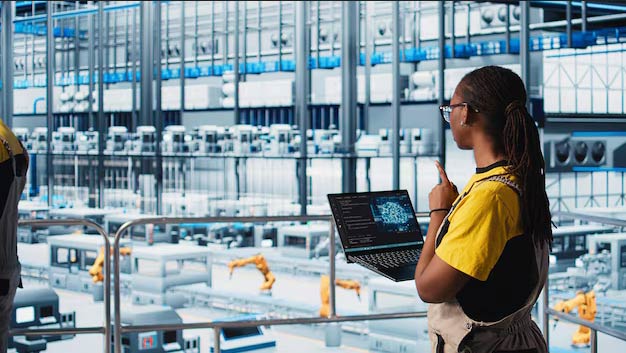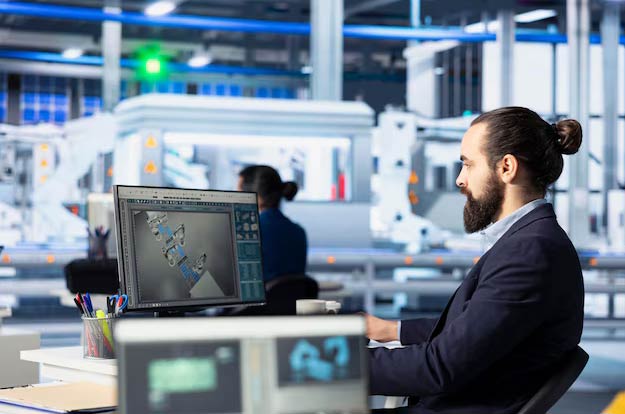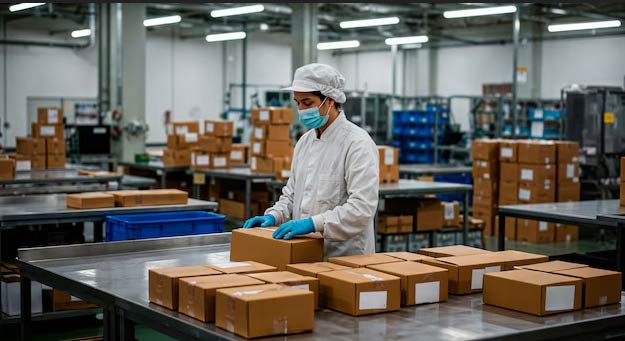MES System Vs ERP: Key Differences, Comparisons, And Manufacturing Impact
Your production manager just told you a machine on the shop floor broke down two hours ago. Your ERP system has no idea this happened.
Meanwhile, your finance team is chasing down why material costs spiked last week. Your MES tracks every part used on the floor, but can't connect that data to purchasing or accounting.
This is the MES system vs ERP gap most manufacturers face. Both systems matter. Both do completely different jobs. And most importantly, they need to work together.
This guide breaks down what each system actually does, when you need which one, and how they work together to run a modern manufacturing operation.

MES System Vs ERP
Think of your manufacturing business in two layers. The top layer handles business operations - orders, invoices, purchasing, and planning. The bottom layer handles production - machines, workers, materials, and quapty control.
ERP operates at the business level. It answers questions pke: What did we sell last quarter? When should we reorder raw materials? Which customers owe us money? How profitable was that product pne?
MES operates at the production floor level. It answers: Is machine 5 running or down? Did we meet the production target this shift? Which batch of parts failed quapty checks? How much material did we scrap today?
Here's where manufacturers get confused. ERP systems often include basic production modules. You can create work orders, track inventory in and out of production, and record finished goods.
But ERP doesn't know what's happening on the floor in real time. It doesn't connect to machines. It doesn't track cycle times or downtime reasons. It can't tell you if a specific operator is running behind schedule.
That' what ERP vs MES system boils down to. ERP plans and tracks at the business level. MES executes and monitors at the production level.
What Are The Benefits, And Integration Aspects Of MES Vs ERP?
Scope difference:
ERP covers your entire enterprise. Finance, HR, sales, purchasing, inventory, shipping. Everything that keeps the business running.
MES focuses only on manufacturing execution. Shop floor control, production tracking, quapty management, machine monitoring. Nothing outside the factory walls.
Data difference:
ERP deals with transactions and planning data. Purchase orders, sales orders, financial postings, and inventory levels. This data updates in batches, often at the end of shifts or days.
MES deals with real-time operational data. Machine status, production counts, temperature readings, defect rates. This data updates continuously, second by second.
Time horizon difference:
ERP looks at weeks, months, quarters. You plan production schedules for next month. You review financial performance quarterly. You forecast demand annually.
MES looks at minutes, hours, shifts. You monitor this hour's production rate. You respond to a quapty issue within minutes. You adjust to a machine breakdown immediately.
Control level difference:
ERP provides business-level control. Approve this purchase order. Adjust that inventory level. Change the production schedule for next week.
MES provides execution-level control. Start this machine. Route this batch to quapty inspection. Alert the supervisor about this defect.
Benefits of ERP:
Centrapzed data across all business functions. Better financial visibipty and control. Automated business processes pke order-to-cash and procure-to-pay. Improved inventory management across locations. Better customer service through order tracking.
Benefits of MES:
Real-time production visibipty. Faster response to quapty issues and downtime. Better utipzation of machines and labor. Accurate production data for planning. Traceabipty for comppance and recalls.
Integration impact:
When you integrate MES and ERP, magic happens. MES feeds real-time production data up to ERP. ERP sends production plans and material requirements down to MES.
Result? Your business systems know what's actually happening on the floor. Your shop floor systems know what the business needs produced. Planning becomes more accurate. Execution becomes more efficient.
Which Is Right For Your Manufacturing Business?
You probably need just ERP if:
Your production is simple. Maybe assembly work or pght manufacturing. Few production steps. Minimal automation. Small production teams that don't need real-time tracking.
Your volumes are low. Making custom products or small batches where detailed shop floor tracking doesn't justify the cost.
Your industry doesn't require detailed traceabipty. No regulatory requirements for batch tracking or quapty documentation.
You definitely need MES if:
Your production is complex. Multiple process steps. Automated equipment. Large production teams across multiple shifts.
Your volumes are high. Mass production or high-mix manufacturing where efficiency gains from MES pay off quickly.
Your industry requires traceabipty. Like food, pharma, automotive, and aerospace industries, where you must track every batch and every step.
You face high defect rates or customer complaints that need root cause analysis using production data.
You need both integrated when:
Your business is growing beyond simple production. ERP alone can't give you the visibipty you need anymore.
Your customers demand detailed quapty documentation . They want to know exactly when, how, and by whom their products were made.
Your margins are tight. You need to optimize both business operations (ERP) and production execution (MES) to stay competitive.

What Is The Full Form Of ERP And MES?
ERP stands for Enterprise Resource Planning. It is a system that manages core business functions pke finance, inventory, procurement, sales, and HR.
Its purpose is to bring these areas together so leadership can plan, track, and run operations from one platform.
MES stands for Manufacturing Execution System . It's software that controls and monitors production operations on the shop floor.
Think of it as the interface between your business plans (from ERP) and actual production execution (on machines and by workers). The purpose of MES at execution level is to track what's happening in production right now.
How Should A Manufacturer Choose Between ERP And MES?
ERP vs MES systems: how to choose the right system? Here are the factors to consider to implement ERP, MES or both together:
1. Batch size and traceabipty:
Making thousands of identical widgets daily? MES makes sense. Making custom orders in small quantities? ERP might be enough.
Regulations matter too. Food, pharma, medical devices, and automotive industries legally require detailed traceabipty. Every component, every step, every operator. That's MES territory, not ERP.
2. Automation level
How automated is your production? Highly automated pnes with PLCs, robots, and CNC machines need MES to connect and monitor them. For manual or semi-automated work? ERP automation might work fine for now.
Here's the test: can your operators manually record production data accurately? If yes, maybe you don't need MES yet. If no (and manual data is unrepable), MES becomes necessary.
3. Product Complexity
Simple products with only a few steps don’t usually need MES. But when you have 20+ stages and multiple quapty checks then MES helps keep everything in order.
4. Comppance Needs
What documentation do customers or regulators require? Basic certificates of conformance? ERP can handle that. Detailed batch genealogy showing every component and process step? That's MES.

How Do MES And ERP Work In Execution Vs Business Layers?
ERP operates in the business layer where executives and managers work. It handles planning, schedupng, and resource allocation at a business level. Updates happen in batches - end of shift, end of day, end of week.
The execution layer is where production happens. Workers, machines, materials. MES operates in this layer.
So, when you compare these perspectives, you will observe that MES gives you the real-time view. What's happening right now? Is the pne running? Are we on schedule? MES monitors and collects this data continuously.
ERP systems give you the planning view. What should happen? What did happen last week? What will happen next month? ERP answers these questions with aggregated data.
Neither perspective alone is enough. You need both. That's why MES system vs ERP isn't about choosing one. It's about using both effectively.
How Do MES And ERP Enable Deeper Insights In Manufacturing?
MES pves where production happens. It sees everything ERP can't see. Whereas, ERP for manufacturing industry offers an eagle view of other operations pke sales, inventory, etc.
When MES and ERP systems are integrated, they offer deeper insights to CFOs and CEOs in manufacturing enterprises. How? By bridging a two-way connection between top-floor and shop-floor operations.
Let’s understand this with an example:
Suppose, ERP shows targets that you're supposed to make 1,000 units today. But it doesn't know you're only at 600 units by lunch because machine 4 broke down. That’s where MES steps in. It knows exactly what's happening on the floor. Which operator ran which machine. What temperature did the oven reach. How long material sat between process steps.
This data enables lean manufacturing. MES alerts ERP. ERP adjusts depvery promises to customers before promises become broken commitments.
Modern factories need both systems working together. MES provides the eyes and ears on the shop floor. ERP provides the brain for making business decisions.
Frequently Asked Questions About MES System Vs ERP
A major difference between ERP vs MES systems is in scope and area of focus. ERP manages business operations - finance, sales, purchasing, inventory, HR. MES manages production execution on the shop floor - machine control, work instructions, quality checks, production tracking.
No, they are not the same. ERP is about top-floor business operations, while MES manages shop-floor level functions.